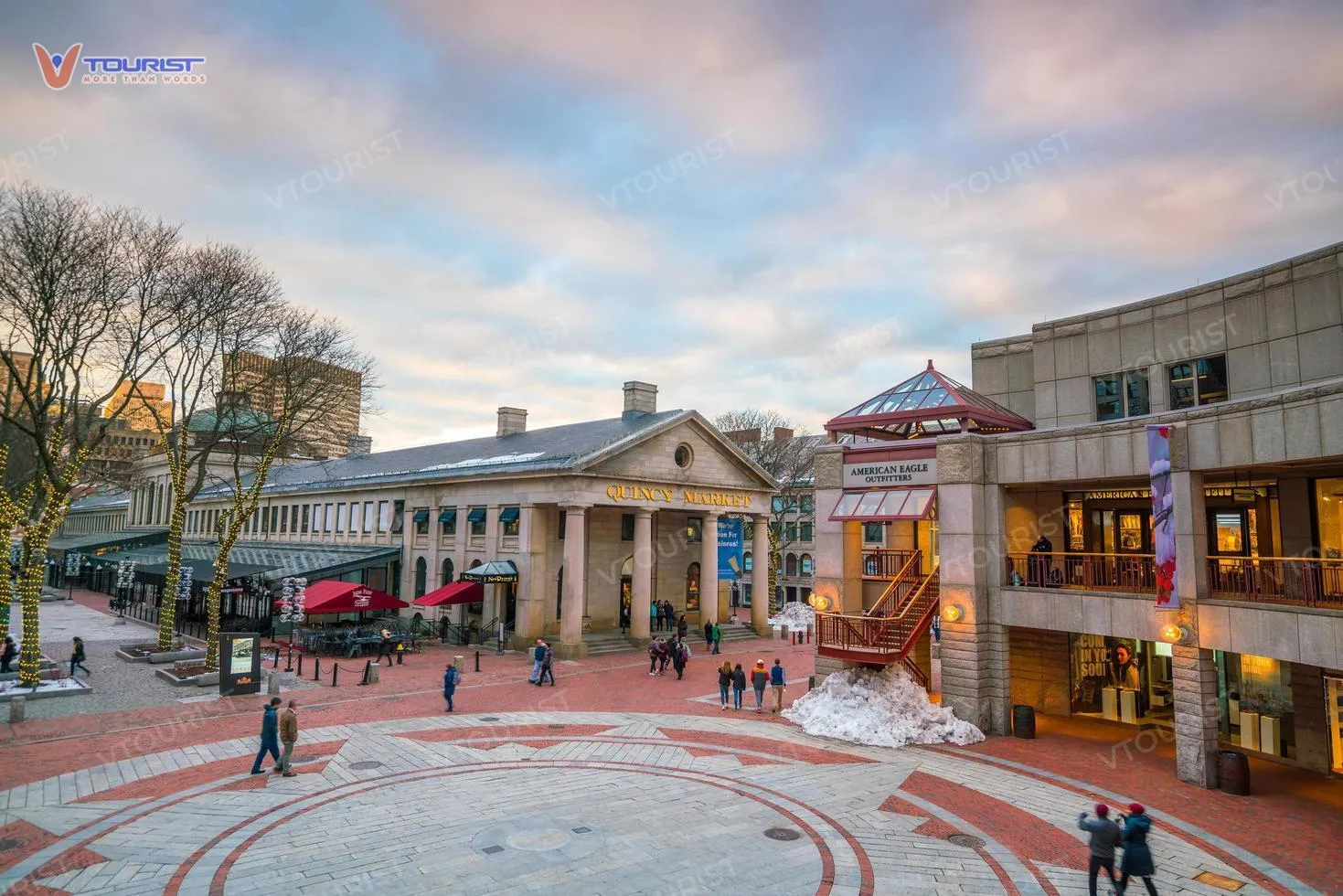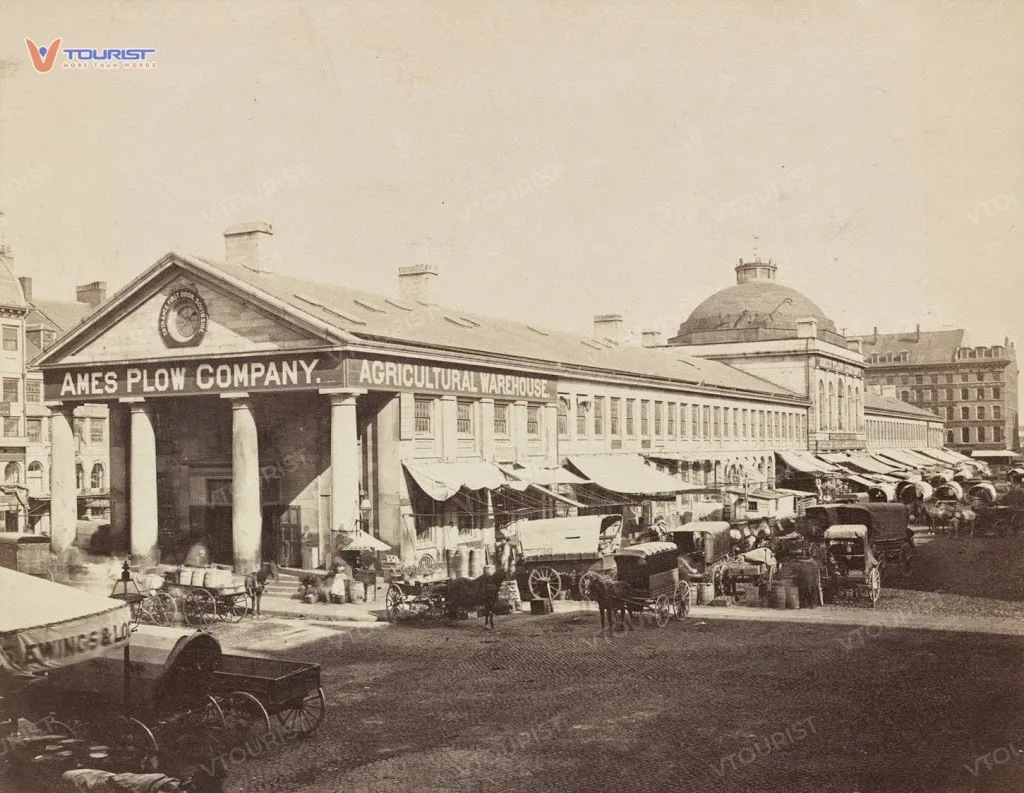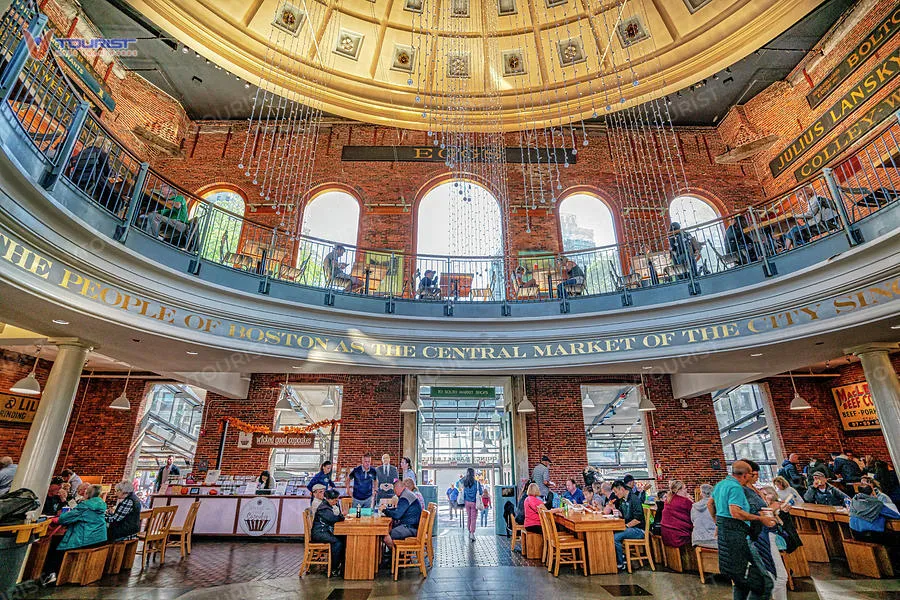Massachusetts, the charming New England state, is renowned not only for its sprawling beaches, vibrant red maple forests, and prestigious universities but also as a repository of ancient markets deeply rooted in cultural and historical significance. Among these, Quincy Market in Boston stands out as a timeless symbol of commerce, a must-visit destination for anyone seeking to explore the cultural essence of this region.
Join “Du lịch khắp thế gian” (Travel the World) on a journey to discover Quincy Market, to experience the vibrant rhythm of life, admire the unique architecture, and savor distinctive culinary flavors. We’ll also broaden our horizons to explore other historic markets in Massachusetts, each with its own unique charm and cultural narrative.
Quincy Market – A Historic Gem in the Heart of Boston
Quincy Market, nestled in the bustling heart of downtown Boston, is more than just a marketplace; it’s a living historical landmark that has witnessed the ebb and flow of this port city. Adjacent to the renowned Faneuil Hall, Quincy Market effortlessly captivates visitors with its classic architectural beauty and lively shopping atmosphere. Stepping into the market is like entering another world, where past and present intertwine, and where traditional cultural values are cherished and preserved.
Prime Location and Unique Architecture
Quincy Market boasts a prime location in the center of Boston, Massachusetts, USA. With its majestic two-story granite architecture, stretching 163 meters, and four sturdy Doric columns in the classic Greek style, Quincy Market is not merely a structure but a unique work of art. Architect Alexander Parris skillfully blended classical and modern styles, creating a space that is both solemn and grand, yet approachable and welcoming. The surrounding area extends to include North Market and South Market, forming a harmonious architectural ensemble that offers a diverse shopping and exploration experience for visitors.

Historical Footprints Through Each Stall
The history of Quincy Market dates back to 1826, when Boston was experiencing rapid economic and population growth, leading to an increasing demand for trade. Faneuil Hall, the previous trading center, became overcrowded, necessitating a new, larger commercial space. The city government decided to build Quincy Market, named after then-Mayor Josiah Quincy, as a solution to expand commercial space and revitalize the downtown area.
To create enough land for the market, part of the harbor was filled in, marking a bold step in Boston’s urban development and expansion. Since its inception, Quincy Market has been a bustling hub for agricultural products and food, supplying fresh produce to the people of Boston. Today, despite numerous transformations, Quincy Market retains its historical and cultural value, serving as a place where visitors can learn about Boston’s vibrant commercial past while experiencing the city’s modern rhythm of life.

Journey Back in Time – Other Historic Markets of Massachusetts
Massachusetts is home to more than just Quincy Market; it harbors many other ancient markets, each carrying a distinct cultural and historical flavor, contributing to the diverse tapestry of traditional market culture in this state.
Salem Witch City Market – Where Witchcraft and Commerce Meet
Salem, a city infamous for its haunting witch trials in history, is also home to a historic market, bearing the imprint of the intersection between the mystical and commercial activities. Salem Witch City Market is not only a place to buy and sell goods but also an attractive tourist destination, where visitors can learn about the city’s “witch” history while exploring unique local crafts and enjoying the distinctive cuisine of the New England region.
Newburyport Farmers Market – Coastal Flavors and Georgian Architecture
Newburyport, a beautiful coastal city renowned for its graceful Georgian architecture and fresh seafood, also boasts a historic market imbued with coastal flavors. Newburyport Farmers Market is not only a trading hub for local seafood and agricultural products but also a vibrant community cultural space, hosting events, festivals, and distinctive cultural activities. Visitors here can stroll along ancient cobblestone streets, admire charming Georgian houses, and savor fresh seafood at the market.
Lexington Farmers Market – A Witness to American Revolutionary History
Lexington, a small town with immense historical significance, is where the Battles of Lexington and Concord took place, marking the beginning of the American Revolution. Lexington Farmers Market, though no longer retaining the ancient charm of Quincy or Salem Markets, is still a place steeped in historical significance, associated with important national events. The modern market continues to serve the local community while being an interesting stop for visitors wanting to learn about American Revolutionary history and explore the simple life of Lexington residents.
Historic Market Cuisine – The Culinary Essence of Massachusetts
The historic markets of Massachusetts are not only places for shopping and historical exploration but also culinary havens where visitors can savor distinctive New England dishes and experience the local food culture.
Clam Chowder and Fresh Seafood at Quincy Market
Visiting Quincy Market, one cannot miss Clam Chowder, a creamy, rich clam soup, imbued with the flavor of the sea. This is an iconic dish of Boston and New England, made from fresh clams, potatoes, salt pork, and fresh cream. In addition to Clam Chowder, Quincy Market also offers countless other fresh seafood dishes such as lobster, scallops, and cod, prepared in various styles to satisfy every visitor’s taste.

Apple Pie and Autumn Specialties at Farmers Markets
In the fall, farmers markets in Massachusetts become busier than ever with seasonal specialties like pumpkins, apples, and maple syrup. Apple pie is an indispensable dessert in New England autumn, made from fresh apples, cinnamon, and sugar, carrying a sweet and warm flavor. Visitors can find apple pie and many other autumn specialties at local farmers markets, enjoying the distinctive flavors of Massachusetts fall.
International Flavors Blending in Multicultural Markets
Besides traditional cuisine, the historic markets of Massachusetts, especially Quincy Market, also offer a diversity of international flavors. Visitors can find dishes from around the world, such as Thai, Indian, Chinese, Italian, and Mexican, creating a rich and appealing culinary tapestry. The blend of traditional and international cuisine has created a unique aspect of market culture in Massachusetts, reflecting the cultural diversity of this region.
Tips for Exploring Historic Massachusetts Markets
To have a complete and memorable experience exploring historic Massachusetts markets, “Du lịch khắp thế gian” (Travel the World) shares a few helpful tips:
- Learn about the market’s history and culture beforehand: Before visiting the market, research its history, architecture, and distinctive culture to gain a deeper understanding of the destination.
- Take time to explore every corner of the market: Historic markets often have many small stalls, food vendors, and hidden corners that hold interesting things. Take time to stroll and explore every nook and cranny of the market so you don’t miss anything.
- Savor local cuisine: Don’t forget to enjoy the signature dishes of the market and the region where it is located. This is a great way to experience local food culture most authentically.
- Shop for unique souvenirs: Historic markets often have many handicrafts and unique souvenirs, deeply imbued with local culture. Choose meaningful gifts for yourself to take home as keepsakes or to give to loved ones and friends.
- Interact with vendors and locals: Don’t hesitate to chat with vendors and local people to learn more about the market and life here. They can share interesting stories and helpful information that you cannot find in books or on the internet.
Conclusion
Exploring the historic markets of Massachusetts is a journey back in time, a unique and profound cultural experience. From the bustling Quincy Market in the heart of Boston to the mystical Salem Witch City Market, the coastal Newburyport Farmers Market, and the historic Lexington Farmers Market, each market carries its own beauty, its own cultural story, contributing to the diverse and rich tapestry of traditional market culture in Massachusetts. Take the time to explore these historic markets to feel the cultural essence, history, and cuisine of the charming New England region, and bring back unforgettable memories from your travels.